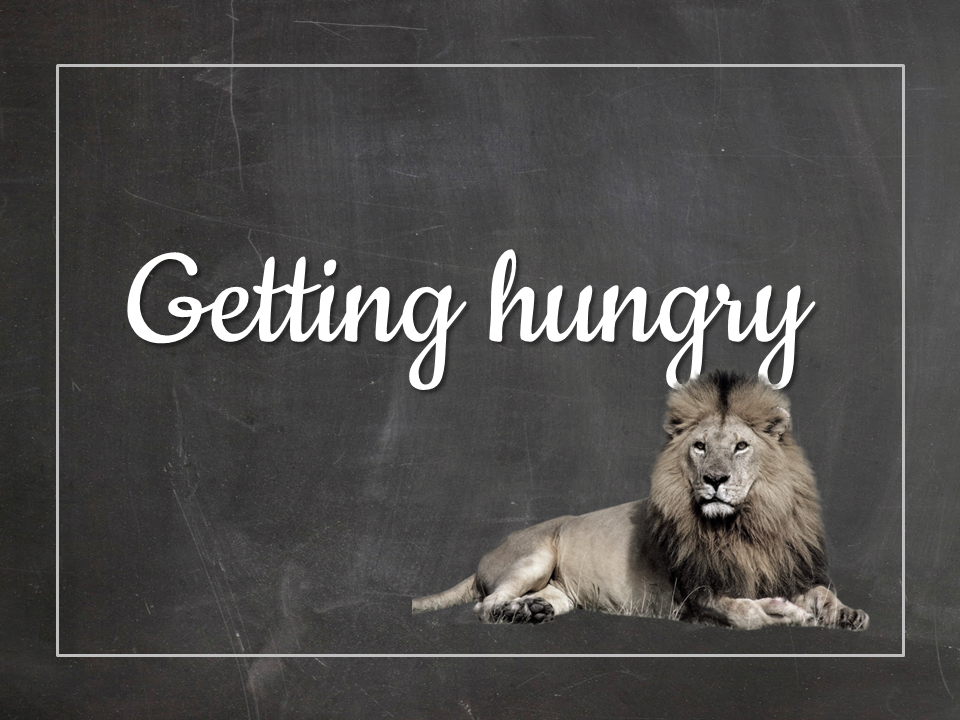Hunger.
I love this topic because I think hunger is the key to so many breakthroughs: Physical and emotional.
However, most of us aren’t comfortable with feeling hungry.
Hunger feels unpleasant and urgent.
And the human brain, because it was created thousands of years ago, is still seeking pleasure and avoiding pain in order to survive… So it’s not interested in being hungry.
In essence, our brain’s primitive survival function is working against us in today’s over-abundance world.
So, if you’ve got belly fat to lose, or you’re battling inflammation, or you’re suffering menopausal symptoms like hot flashes or night sweats, or you’re eating to avoid feeling certain emotions…
Learning to be hungry could change everything for you.
I think it’s time you got comfortable with being hungry
Did you know that your body, as long as it’s hydrated, can go without food for at least 3 weeks?
That’s amazing!
And yet many of us are reluctant to even skip a meal.
When hunger shows up, we panic and immediately we go to the nearest pantry, fridge, or local convenience store to make it stop.
But hunger isn’t an emergency.
In fact hunger comes and goes. If you don’t feed it right away, it will leave and come back later.
Imagine, there was a time when we didn’t know when our next meal would be. (And in fact, there are still many people living this reality today.)
Luckily, the body evolved to survive for long stretches of time without food.
However, most of us didn’t grow up with food scarcity. Instead we were raised surrounded by food.
And we were taught to eat 3 square meals a day: Breakfast, lunch, and supper.
Apparently it was decided that it was the “civilized” thing to do back about 200 years ago.
There’s literally no scientific basis for eating 3 meals a day.
And never mind the other “meals” like dessert, snacks, or grazing all day long.
These are all concepts that we practice now because we have an over-abundance of food, which wasn’t the case for most of human history.
But your body doesn’t know that yet.
It hasn’t had time to evolve to the point where it can effectively process how much you’re feeding it.
But your body is equipped with a beautifully flexible mechanism: Hunger.
If you skip a meal today, you’ll feel hunger. And that’s not a negative thing.
When your body feels hunger at certain times it’s because you’ve conditioned yourself to eat at those times, that’s it.
If you changed the times you ate, your hunger would adapt to your new schedule.
It’s an amazing thing.
What’s the advantage of sitting though hunger?
As I mentioned before, your body can go without food for about 3 weeks.
So that means that when you don’t eat, your body is able to take the energy it needs from what you’ve already got stored in your body… Namely body fat.
For those of us that have excess body fat, this is a super important concept.
So, let’s repeat it: When you’re not getting fuel from food, your body will burn body fat to get what it needs (Brooke Castillo calls it “dining in”… love it!).
Now I don’t suggest a 3-week fast, that would cause all kinds of other problems.
But the idea of smaller, daily fasts is do-able and in fact, recommended.
By a daily fast I’m talking about not eating (or drinking anything other than water ) from supper to breakfast.
This concept is called intermittent fasting. ( See my post Flirting with intermittent fasting)
Basically, any time that your body is fasting, and isn’t busy digesting, it has the opportunity to do other things like:
- Burn fat
- Repair cells
- Become less insulin resistant
- Become less estrogen dominant (did you see last week’s video?)
- Improve brain function
- Reduce depression
- Reduce inflammation
- Prevent conditions like heart disease and cancer
Get curious about your hunger
I’ve been feeling the benefits of my own daily fast for a while now.
My routine is that I stop eating after supper, which for me is around 6pm, and then I don’t eat until breakfast around 8am.
That 14-hour fast gives my body time to digest and renew itself.
But when I started, I never thought I’d be able to do it.
I was so used to eating breakfast immediately when I woke up that I thought I’d starve if I left the house without eating.
But now, I don’t feel the hunger I used to feel at 5:30am. Instead it shows up around 8am.
It’s the most incredible thing!
For me, I feel the effect has been a less bloated belly and better focus.
I also feel empowered that I can change old, ingrained habits.
Now, for you, the effects can be very different.
That’s why it’s important to ease into it.
Step 1: Awareness of hunger
If you don’t usually allow yourself feel hunger before eating, begin by practicing eating when you feel hungry (instead of out of habit, the time of day, emotions,…).
Notice if you’re really hungry by checking out your thoughts:
“I need to eat” = I’m hungry
“I want to eat” = I’m feeling like I want a certain food (a craving) or I’m avoiding feeling or experiencing something (an emotion)
“I should eat” = It’s noon so I should eat lunch
Step 2: Controlling your hunger
Then, once you’re used to the feeling of hunger, I suggest starting with an 11 or 12-hour fast and then increasing it, if you want, once your body has gotten used to it.
In this way, you create your own eating schedule, that works for you, and your body will adapt by feeling hungry at those chosen times.
Feeling hunger is mind over matter
Remember that hunger comes in waves and it’s not an urgent need.
But, sitting through it will be tough at first.
You’ll be faced with some thoughts and feelings that you might have been burying with food for years.
So you’ll need a strong reason for why you’re doing it.
Gandhi famously staged many hunger strikes because he had a strong desire and belief in an independent India.
What’s your compelling reason? A reason that could bring you to tears?
Once you have it, use your mind to focus on this reason. Then feel the emotions that will show up when you feel hunger – maybe for the first time in years.
Also, use your mind to to appreciate the gift of hunger. Think something like, “I’m giving my body a break from constant eating and digesting so it can access fat as fuel. ” A thought like this can be very powerful.
Finally, get a coach to help guide you through the rough patches. A coach can prepare you for the obstacles before they show up, and help you get over them when they seem to be in your way.
Are you willing to feel hunger, or try intermittent fasting?
I’d love to hear what you have to say in the comments section below.
Thanks for sharing!
Keep moving forward,
Debbie
P.S. If you’re curious about how I can help you as a coach, then book a free 15-minute coaching session with me.
Click on the link and choose a time that fits your schedule 🙂


